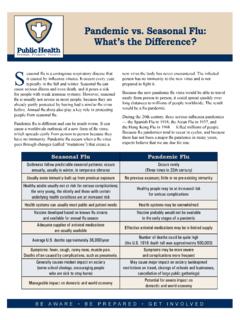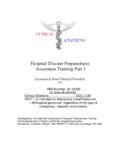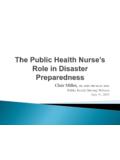Transcription of Your guide to EMERGENCY PREPAREDNESS
1 EMERGENCYPREPAREDNESSYour guide toin the Greater Kansas City regionPublished in cooperation with the Regional Homeland Security Coordinating CommitteePLATTERAYCASSLEAVENWORTHWYANDOT TEMIAMIJOHNSONJACKSONCLAYP reparedness Starts With You! PREPAREDNESS Starts With You!When disaster strikes, you may not have much time to respond. A spill of hazardous material could mean immediate evacuation. A winter storm could confine your family at home. An earthquake, tornado or any other disaster could cut off basic services gas, water, electricity and telephone for a disaster, local officials and relief workers will not be able to reach everyone immediately. Help could come in hours, or it may take days. Will your family be ready?You ll cope best by preparing for disaster before it strikes. In this booklet, we offer simple guidelines that will help you and your family prepare for can happen anytime and anywhere.
2 The time to prepare is now before disaster strikes. Make an EMERGENCY Plan ..20 Create a Supply Kit ..22 Seniors ..24 Children ..25 Special Needs ..26 Pet Safety ..27 Web Resources ..28 Volunteer Opportunities ..29 Your Evacuation Plan ..30 Utility Information ..31 Home Hazard Hunt ..32 Family Medical Information ..33 Important Numbers ..34 Local EMERGENCY Numbers ..35 EMERGENCY Management Offices ..36 Know the RisksCalling 9-1-1 ..2 NOAA All-Hazards Weather Radios ..3 Tornadoes ..4 Severe Thunderstorms ..5 Flash Floods ..6 Earthquakes ..7 Excessive Heat ..8 Drought ..9 Winter Weather ..10 Power Outages/Food Safety ..11 Generator Safety ..12 Carbon Monoxide Dangers ..13 Fire ..14 HazMat/Sheltering in Place ..15 Terrorism ..16 Transportation Safety ..17 Pandemic Flu ..18 First Aid ..19 Get of ContentsTable of ContentsCalling 9-1-1 Calling 9-1-1 Call 9-1-1 to stop a crime, to report a fire, to save a life or anytime an EMERGENCY response is required by law enforcement, fire or EMERGENCY personnel.
3 You should call 9-1-1 anytime you believe there is an actual EMERGENCY . If you are unsure, call 9-1-1 and the dispatcher will make the final determination. When you call 9-1-1 to report an EMERGENCY , the dispatcher will ask you five basic questions: Where is this happening? When did this happen? What is happening now? Why? Who is involved? Is anyone injured?Be prepared to tell the dispatcher the exact location of the EMERGENCY and give a clear description of what is don t call 9-1-1 to report that electricity or other utilities are off; to notify authorities of traffic jams; to inquire about government services; or for general information. If you accidentally dial 9-1-1, stay on the line and explain to the dispatcher. Otherwise the dispatcher will have to call you All-Hazards RadiosNOAA All-Hazards RadiosNOAA (National Oceanic and Atmospheric Administration) all-hazards weather radios provide constant, up-to-date weather information.
4 During severe weather, the National Weather service broadcasts a special tone that activates weather radios in affected areas. You can program your radio to sound warnings for specific sounding alarms inside homes, schools and businesses, all-hazards weather radios can alert people who are indoors and save lives. Project Community Alert is a community-wide effort to distribute all-hazards weather radios in the Greater Kansas City area. The Metropolitan EMERGENCY Managers Committee partners with local Price Chopper grocery stores to sell the radios at a low cost. While these radios are primarily used for severe weather alerts, authorities can also use them to issue warnings about other types of emergencies, such as chemical spills or biological more information about Project Community Alert, visit are capable of tremendous destruction. Be alert for watches and warnings in your area.
5 Tornado safety tips Take your EMERGENCY kit with you to the lowest level possible in a structure. Put as many walls between you and the outside as you can. Avoid windows and glass. In a basement, stay under a center support beam, a stairwell or heavy piece of furniture. If you have no basement, go to a small interior room (bathroom or closet) away from outside walls and windows. If a tornado is visible when driving, you may be able to drive out of its path by moving at right angles to the tornado. Otherwise, stay in your car with your seat belt on and head below window glass. Avoid seeking shelter under bridges or overpasses. Mobile homes offer no protection from tornadoes. Get to a safe shelter if Warning: A tornado has been sighted or indicated by weather Watch: Tornadoes are possible in your area. Remain alert. Find out what counties are in the watch area by listening to your NOAA all-hazards radio or local ThunderstormsSevere ThunderstormsNot all thunderstorms are classified as severe, but all are dangerous.
6 Thunderstorms may include strong winds, lightning, hail, heavy rain, flooding, downbursts and tornadoes. Although they are most likely in spring and summer, they can occur year round. Thunderstorm safety tips If you can hear thunder, go indoors. Avoid using electrical appliances and stay off the phone except in emergencies. Do not take a bath or a shower during a thunderstorm. If you are caught outdoors, find a low spot away from trees, fences and poles. If you are boating or swimming, get to land and find shelter immediately!During a thunderstorm, each flash of cloud-to-ground lightning is a potential killer. If you feel your skin tingle or your hair stand on end, squat low on the balls of your feet, with your hands on your knees and your head between them. The 30-30 rule: If there s 30 seconds or less between a flash of lightning and the sound of thunder, seek shelter immediately.
7 Wait at least 30 minutes after the last clap of thunder before leaving shelter. floods can occur within minutes or hours of excessive rainfall. Whether you are driving or walking, if you come to a flooded road, the National Weather Service advises you to Turn Around Don t Drown. Even six inches of fast-moving floodwater can knock you off your feet, and a depth of two feet will float your car. Flood Safety Tips Monitor your NOAA all-hazards weather radio or local television and radio stations for weather-related information. If flooding occurs, get to higher ground. Get out of areas that are normally subject to flooding. Avoid areas that are already flooded, especially if the water is flowing fast. Do not attempt to cross flowing streams. Remember, road beds may be washed out under flood waters. NEVER drive through flooded roadways. Do not park your vehicle near streams or creeks, particularly during threatening conditions.
8 Take extra precautions at night when it is harder to recognize flood FloodsFloods/Flash Floods6 Turn Around, Don t Drown of the largest earthquakes ever recorded in the took place in Missouri. Earthquakes are most common in the western states, but they can happen any time, anywhere. Safety rules and precautions Before an earthquake, identify places in your house to take shelter, such as under a sturdy table or next to an inside wall. Don t place beds by windows, and don t hang heavy items over beds. Secure things that might fall, such as heavy TVs. Put strong latches on cupboards. During an earthquake, stay indoors. When you do leave a building, move away from it quickly. Get away from windows to avoid breaking glass. Don t use elevators. Wait until the shaking stops completely before venturing out. Outdoors, find a spot away from buildings, trees and power lines.
9 Drop to the ground. If you are in a car, stop in a clear location as quickly as you can. Stay in the car with your seat belt fastened. Avoid the use of candles or open flame after an earthquake in case of gas courtesy of Great ShakeOut Earthquake Drills, HeatExcessive HeatMany people do not realize how deadly a heat wave can be. More people die in an average year in Kansas City from heat-related conditions than from all other weather types combined. Heat Safety Tips Do not leave children or pets in a vehicle. Temperatures can reach over 140 within minutes. Drink plenty of water, even if you re not thirsty. Avoid alcohol and caffeine. Wear loose-fitting, lightweight, light-colored clothing. Avoid going out during the hottest times of the day. If you must go out, use sunscreen and wear a wide-brimmed hat. Inside during the day, keep shades drawn and blinds closed. Use air conditioning when available.
10 Fans should not be your primary source of cooling. Blow hot air out a window with a fan during the day, and blow cooler air in at night. Listen to your NOAA all- hazards weather radio to keep up with the latest heat watches, warnings and are unique among natural disasters. We don t know we re in a drought until weeks after it begins, making preparation difficult. Once a drought is underway, water conservation is the only way we can lessen its conservation tips Fix leaky faucets and plumbing joints. Install water-saving shower heads and take shorter showers. Run only full loads in the washing machine and dishwasher and use the shortest wash cycle. Turn off the water while brushing teeth, shaving, etc. Chill drinking water in the refrigerator instead of letting the tap run. Use a broom instead of a hose to clean driveways and sidewalks. Water your lawn only when it needs it, and water during the cool parts of the day.





